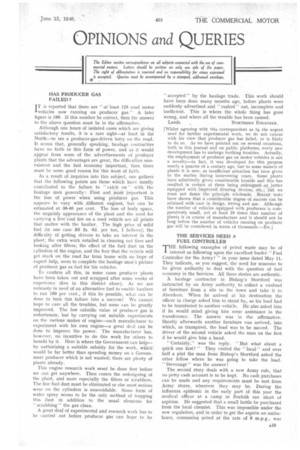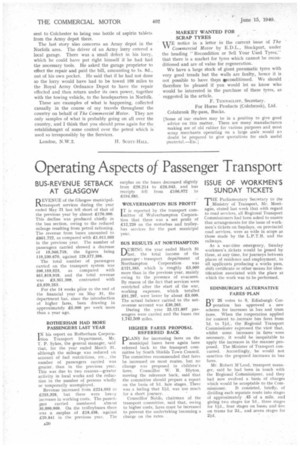OPINIONS and QUERIES The Editor invites correspondence on all subjects
Page 21

Page 22

If you've noticed an error in this article please click here to report it so we can fix it.
connected with the use of commercial motors. Letters should be written on only one side of the paper. The right of abbreviation is reserved and no responsibility for views expressed
is accepted. Queries must be accompanied by a stamped, addressed envelope. •
HAS PRODUCER GAS FAILED?
IT is reported that there are "at least 125 road motor 'vehicles now running on producer gas." A later figure is 190. If this number be correct, then the answer to the above question must be in the affirmative.
Although one hears of isolated cases which are giving satisfactory fesults, it is a rare sight—at least in the North—to see a producer-gas-driven lorry on the road, It seems that, generally speaking, haulage contractors have no faith in this form of power, and as it would appear from some of the advertisements of producer plants that the advantages are great, the difficulties nonexistent and the fuel economy important, then there must be some good reason for this want of faith.
As a result of inquiries into this subject, one gathers that the following points are those which have mostly contributed to the failure to "catch on" with the haulage men generally : First and most important is the loss of power when using producer gas. This appears to vary with different engines, but can be estimated at 30-40 per cent. The loss of body space, the ungainly appearance of the plant and the need for carrying a live' coal fire on a road vehicle are all points that matter with the haulier. The high price of solid fuel (in one case £6 2s. 6d. per ton, I believe); the difficulty of getting drivers to take an interest in the plant; the extra work entailed in cleaning out fires and looking after filters; the effect of the fuel dust on the cylinders of the engine, and the fear that the vehicle will get stuck on the road far from home with no hope of expert help, seem to complete the haulage man's picture of producer gas as fuel for his vehicles.
To confirm all this, in some cases producer plants have been taken out and scrapped after some weeks of experience (five in this district alone). As we are seriously in need of an alternative fuel to enable hauliers to run 100 per cent., if this be possible, what can be done to turn this failure into a success? We cannot hope to cure all the troubles, but some can be greatly improved. The low calorific value of producer gas is unfortunate, but by carrying out suitable experiments on the various makes of engine—each manufacturer to experiment with his own engine—a great deal can be done to improve the power. The manufacturer has, however, no incentive to do this work for others to benefit by it. Here is where the Government can help— by authorizing a suitable subsidy for the work, which' would be far better than spending money on a Government producer which is not wanted; there are plenty of plants already.
This engine research work must be done first before we can get anywhere. Then comes the redesigning of the plant, and more especially the filters or scrubbers. The fine fuel dust must be eliminated or else most serious wear on the cylinders is unavoidable. Some form of water spray seems to be the only method of trapping this dust in addition to the usual elements for " scrubbing" the gas clean.
A great deal of experimental and research work has to be carried out before producer gas can hope to be
" accepted" by the haulage trade. This work should have been done many months ago, before plants were suddenly advertised and " rushed " out, incomplete and inefficient. This is where the whole thing has gone wrong, and where all the trouble has been caused.
Leeds. , NORTHERN ENGINEER. [Whilst agreeing with this correspondent as to the urgent
need for further experimental work, we do not concur with his view that producer gas has failed, or is likely to do so. As we have pointed out on several occasions, both in this journal and on public platforms, every new development has to undergo teething troubles. Actually, the employment of producer gas on motor vehicles is not a novelty—in fact, it was developed for this purpose nearly a quarter of a century ago, but to some makers of plants it is new, as insufficient attention has been given to the matter during intervening years. Some plants have admittedly given considerable trouble and this has resulted in certain of them being redesigned or better equipped with improveil filtering devices, etc., but we must not damn the principle wholesale. Recent tests • have shown that a considerable degree of success can be attained with care in design, fitting and use. Although the number of vehicles equipped with producers is comparatively small, yet at least 10 times that number of plants is in course of manufacture and it should not be long before the number of vehicles running on producer gas will be considered in terms of thousands.—En.]
THE SERVICES NEED A FUEL CONTROLLER
THE following examples of petrol waste may be of interest as following upon the excellent leader "Fuel Controller for the Army? " in your issue dated May 11. They indicate, as you suggest, the need for someone to be given authority to deal with the question of fuel economy in the Services. All three stories are authentic.
A. haulage contractor in Bishop's Stortford was instructed by an Army authority to collect a vanload of furniture from a site in the town and take it to Aberdeen. When he arrived at his destination the officer in charge asked him to stand by, as his load had to be transferred to another vehicle. He also asked him if he would mind giving him some assistance in the transference. The answer was in the affirmative. Shortly afterwards another furniture van arrived, into which, as transpired, the load was to be moved. The driver of the second vehicle asked the man on the first if he would give him a hand.
"Certainly," was the reply. "But what about a quick one first? " They visited the "local" and over half a pint the man from Bishop's Stortford asked the other fellow where he was going to take the load. " Stevenage" was the answer!
The second story deals with a new Army rule, that no petty cash account is to be kept. No cash purchases can be made and any requirements must be met from Army stores, wherever they may be. During the influenza epidemic in the early part of this year the medical officer at a camp in Norfolk ran short of aspirins. He suggested that a small bottle be purchased from the local chemist. This was impossible under the new regulation, and in order to get the aspirin an ambulance, consuming petrol at the rate of 9 m.p.g., was sent to Colchester to bring one bottle of aspirin tablets from the Army depot there.
The last story also concerns an Army depot in the Norfolk area. The driver of an Army lorry entered a local garage. There was a small defect in his lorry, which he could have put right himself if he had had the necessary tools. He asked the garage proprietor to effect the repair and paid the bill, amounting to Is. 8d., out of his own pocket. He said that if he had not done so the lorry would have had to be towed 108 miles to the Royal Army Ordnance Depot to have the repair effected and then return under its own power, together with the towing vehicle, to the headquarters in Norfolk.
These are examples of what is happening, collected casually in the course of my travels throughout the country on behalf of The Commercial Motor. They are only samples of what is probably going on all over the country, and I think that you should press again for the establishnvnt of some control over the petrol which is used so irresponsibly by the Services.
London, N.W.2. H. SCOTT-HALL.
MARKET WANTED FOR , SCRAP TYRES
WE notice in a letter in the current issue of The Commercial Motor by E.D.L., Stockport, under the heading "Recondition or Sell Your Used Tyres," that there is a market for tyres which cannot be reconditioned and are of value for regeneration.
We have a large stock of giant pneumatic tyres with very good treads but the walls are faulty, hence it is not possible to have the.m .conditioned. We should therefore be pleased if you would let us know who would be interested in the purchase of these tyres, as suggested in the article.
F. TLJNNACLIFF, Secretary.
For Horne Products (Colnbrook), Ltd. Colnbrook By-pass, Bucks.
[Some of our readers may be in a position to give good advice on this matter. There are many manufacturers making use of old rubber for various purposes and most scrap merchants operating on a large scale would no doubt be prepared to give quotations for such useful material.—ED.1




















































